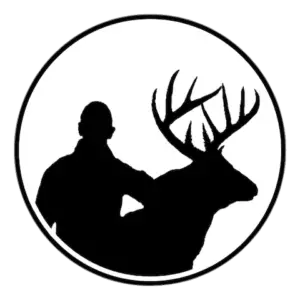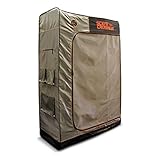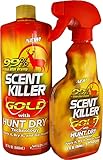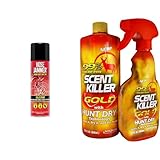After years of deer hunting and killing several mature bucks, I have learned a lot about scent control. I’ve tested several different approaches to scent control from one extreme to the other. After all these years of hunting, I have found what I believe to be the best approach. I am going to share my approach with you in this article. So, how should you manage your scent to see more deer?
The most important thing you can do is to play the wind and thermals. Make sure your scent is blowing towards areas that deer aren’t likely to be. The second most important thing you can do to see more deer is through managing your human odor by taking scent free showers and washing your clothes with scent free detergent.
The chart in the picture below shows how important playing the wind is when it comes to seeing more deer. Even though playing the wind will help you beat a deer’s nose 75% of the time, the other 25% is still important. That 25% can be the difference between you killing a giant buck or not.
Like I said in the opening paragraph, I have tried several different approaches to scent control and tested many products being sold on the market. I believe that you don’t need most of these high-priced products to beat a whitetail’s nose. However, there are several cheaper products in my scent control program that I use regularly that help me beat whitetails nose’s every year. I will add links to those specific products so that you can see what my recommendations are.
If you follow these 20 tips below, you should expect to see more deer this season. However, you can’t skip #1 because of how important it is. I can’t stress enough that you shouldn’t hunt a stand if your wind is wrong. Now, let’s dive in!
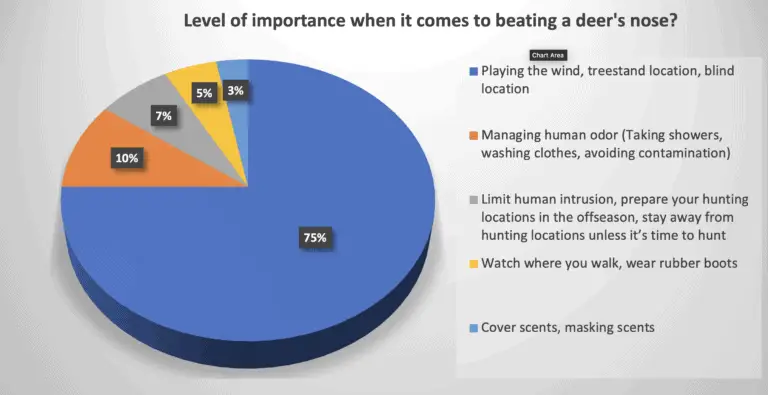
20 tips to beat a deer’s nose
1. Play the wind & thermals
If the wind or thermals is blowing your scent to where deer could be, then you should expect deer to be alerted by your presence. Are the deer you are hunting potentially on your neighbor’s property? My guess is yes, they probably are. Therefore, don’t assume that you can blow your wind towards the neighbor’s property without educating the deer you are hunting.
Deer don’t recognize boundary lines, so keep your scent from blowing towards areas where deer can smell you. Consider where you scent is blowing while entering, exiting, and hunting your spot.
2. Choose ideal hunting locations
The location where you choose to hang your treestand, setup a tower blind, or hunt from the ground will help you succeed at playing the wind. Some of my favorite hunting locations are field edges, ridgetops, on the edge of water, and along roads. Each of these locations allows for more predictable winds and usually have areas for my wind to blow in a safe direction.
3. Hunt from elevated positions (treestands and blinds)
Treestands and tower blinds help keep your scent high off the ground. If I’m hunting from a treestand on a field edge, a decent wind should blow my scent over the back of any deer that walks down that edge.
Tower blinds and some ground blinds can trap your scent within the blind. If you are hunting in locations where the wind commonly swirls, like in bottomlands, I recommend hunting out of blinds that can lock your scent within them.
4. Prepare hunting spots in the offseason
Human pressure is one of the most common reasons why people don’t see deer. Therefore, you can beat a deer’s nose by staying away from your hunting locations during hunting season and the weeks leading up to it. Consider only stepping foot on your hunting lands when it’s time to hunt. Prepare your hunting locations several months before the start of hunting season.
Before the start of deer season I hang my treestands, prepare blinds, trim shooting lanes, hang trail cameras, and so much more. By not doing these activities during deer season, or the weeks leading up to it, it provides enough time for deer to lower their guard and start feeling comfortable using the property again. This makes it much easier for me to beat a deer nose when it’s time to hunt them.
5. Watch where you walk
The amount of scent you leave behind on the ground can be determined by what you walk on and/or what your body touched on the way into your hunting location.
Access hunting locations where deer aren’t likely to walk on your same access trail. If a deer happens to come along your access trail, it’s preferred that they cross it perpendicularly as opposed to walking along it. If they walk along your access trail, they are more likely to smell your ground scent.
If you have the option of walking on a dry surface or a wet surface, walk on the dry surface. Dry surfaces don’t hold scent as well. Deer lick their noses for a reason, because it helps them to smell better.
Lastly, avoid rubbing up against tall vegetation or touching anything else during your entry and exit. Any scent that is left behind at nose level of a deer is going to be easier for them to detect.
6. Wear rubber boots
Rubber boots are better than fabric boots when it comes to minimizing the scent we leave behind on the ground. Fabric boots absorb odors and spread more or those odors than rubber boots will. We can minimize the scent we leave behind on our access trail just by wearing rubber boots. I own these LaCrosse rubber boots and I love them.
7. Shower with scent free soap
If your scent makes its way to a deer’s nose, they will smell you. The question is, how will that deer react to the smell? A strong human odor is more likely to put deer at full alert and send them running. If a deer only slightly smells you, they may investigate if your actually still around or not, which could lead to a shot opportunity on that deer.
I like to compare this situation to humans smelling a skunk. If you walked into your back yard and smelled a strong skunk smell, you would probably think that the skunk is close by. I wouldn’t recommend looking for it so that you get sprayed. However, if you barely smelled a skunk then you might think it’s far away or maybe the smell is a few days old. You probably wouldn’t hesitate walking into your back yard if the smell wasn’t very strong. I think deer respond to our human order the same way. They feel less threatened if our human odor isn’t that strong.
8. Wash hunting clothes with scent free detergent
I wash my hunting clothes by hand in a plastic storage bin. I don’t like using the same washing machine that I wash my everyday clothes in because the laundry detergents are different.
I only wash my hunting clothes a few times per year, so washing them by hand is not that big of an inconvenience. I wash them at the start of deer season and I won’t wash them again unless I happen to get them muddy or introduce foreign odors to them. The base layers that touch my skin are the one exception. I wash the clothes that touch my skin frequently throughout deer season.
9. Dry clothing outside or use a drying machine with dryer balls
Moisture is the breeding ground for bacteria, and bacteria is what creates unwanted odors on our clothes. Therefore, make sure your clothes are completely dry before storing them away. Hang your clothes outside or use a drying machine with the dryer balls. Never dry hunting clothes with dryer sheets because they can harm the textiles in the fabric of the clothes. The technologies in hunting clothes that make them breathable, quick drying, water-resistant, anti-microbial, and so on, do not hold up well to dryer sheets, fabric softeners, or high heat.
10. Store your clothes in a bag, container, or both
I store all of my hunting clothes and boots in duffle bags and plastic totes. This protects the clothes from absorbing foreign odors and helps keep me organized.
The totes are convenient for storage in the off-season and it also allows me to throw them in my truck bed without worrying about the clothes getting wet or bloody. The double protection guarantees that my clothes don’t get contaminated.
I have several different duffle bags and totes, each with a specific purpose. I have one for all my pants and bottoms, one for all my jackets and tops, and one for my late season jacket and bibs. Lastly, I keep all of my gloves, hats, gaiters, socks, and underwear in a smaller bag. This system makes it easy to find exactly what I need for my hunt based on various weather conditions.
Everything that I described in the previous paragraph is how I store my clothes and keep them organized. However, when I’m about to go hunting for the day I throw the specific clothing items that I need into an empty duffle bag. After the hunt is over, I will throw these clothes back into the bags and totes where they belong.
Lastly, a hunting closet is another excellent option for storing hunting clothes. Just make sure it’s not exposed to foreign odors. A closet makes it easier to see all your clothes without having to dig around in a duffle bag.
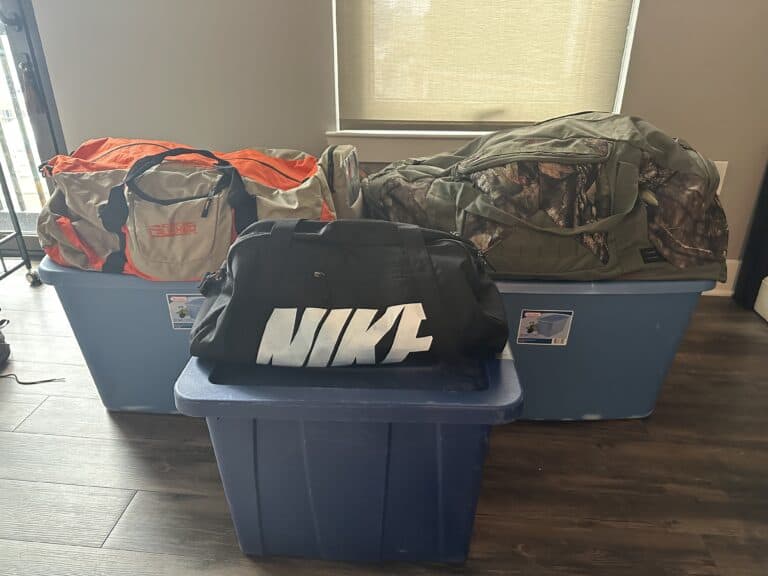
11. Handle clothing after you shower or wash your hands
Try not to handle your clothing without washing your hands with scent free soap or after you take a scent free shower prior to hunting.
12. Fill your gas tank on days that you don’t plan to hunt
Regardless of whether or not you are hunting on a specific day, try to keep in mind the odors that are being introduced to you or your vehicle. Avoid pumping gas on the same day that you plan to hunt.
13. Don’t wear hunting clothes unless you are hunting
I keep my hunting clothes inside a duffle bag unless I’m hunting. However, I will still wear my base layers on the way to the woods.
I can’t tell you how many times I’ve seen people wearing their hunting clothes while not hunting. You want to prevent your clothes from being exposed to foreign odors such as campfires, dogs, cats, gas fumes, sweat, cigarette smoke, and so on. All of these odors will make it easier for deer to detect you.
At a minimum, keep your outer-most garments inside a duffle bag until you’re ready to enter the deer woods.
14. Clean your truck of unusual odors
Have you ever got into someone else’s vehicle and it had a smell to it? Your vehicle may smell normal to you, but it’s not normal to a deer. If a human can smell car odors, then you can bet that deer can smell it to. Therefore, reduce the amount of odor in your car and try to make it smell like nothing at all.
I’m not a huge fan of ozone products for deer hunting but I do think they have their place. For example, I will put an ozone generator in my truck to kill as much odor as possible. This generator will leave behind an ozone smell that eventually goes away, but I believe that this ozone smell is less threatening than most of odors inside our vehicles.
15. Keep your body temperature and feet cool
Picture this, you wake up to go hunting and it’s a cold morning. You get dressed in warm clothing, jump inside your vehicle, turn the heat on, and then drive to your hunting spot. While driving, your body starts warming up and your feet and lower back begin to sweat. Once you get to your hunting spot and step outside the vehicle, your sweat turns into cold almost instantly.
This situation is not only uncomfortable, but now you have created odors that have been absorbed in your clothing. You can avoid this situation by managing the heat inside your vehicle and by choosing the correct clothes and shoes to wear while driving.
Another common way that hunters sweat prior to hunting is when approaching their hunting locations. If you are walking to your stand or doing a hang-and-hunt, dress as light as you can and consider carrying your jacket and pants into the woods with you. I try to keep myself a little bit cold on my way to the stand so that I don’t sweat. If I think I’m going to sweat on my way to the stand I will put on my pants and jacket at the base of the tree where my treestand is.
16. Avoid smoking, chewing, vaping
If humans are capable of smelling something, then expect deer to smell it about a thousand times better than us. Avoid smoking, chewing tobacco, or vaping prior to and during hunting. You especially don’t want to do these things while wearing your hunting clothes because those odors can be absorbed in your clothes.
17. Watch what you eat and drink before hunting
In most situations, deer associate the smell of human food with danger. So, be mindful of what you eat before entering the deer woods. Try to avoid eating or being around smelly foods and drinks like garlic, onions, coffee, etc.
If you’re like me then you need caffeine in the morning and during the middle of the day. I typically drink an energy drink in the morning instead of coffee because it has a less severe odor. Additionally, I put a 5-hour energy shot in my pocket if I’m sitting in the woods all day. These are great for all-day hunts or if you start falling asleep while hunting.
18. Watch what you eat and drink in the woods
If you need a snack while hunting, try to eat foods like nuts or granola bars. Like I mentioned before, I will drink a 5-hour energy shot when I get tired, but I mostly stick to drinking just water when I’m in the woods. I won’t even take water or food with me to the woods unless I’m planning on hunting all day.
19. Spray yourself down before you hunt
If you have done a really good job at following tips 1-18 in this article, you might not need to spray yourself down prior to hunting. However, spraying yourself with a scent killer is an extra precaution that you can take if you think you may have contaminated your clothing.
Don’t think that spraying yourself down with scent-killer prior to hunting means that you don’t have to pay attention to scent control. Many of these scent killer products will claim that they kill 99% of human odors. This might lead some people to believe they don’t have to worry about scent control as long as they spray themselves down prior to hunting. However, I don’t think any of these scent-killers will remove stronger odors like smoke for example.
20. Use cover scents
Cover scents help to mask the smell of human odor. If you are hunting a risky location where deer are likely to catch your scent, or if you want to take an extra precaution, use a cover scent like nose jammer. Nose jammer can help increase your odds of fooling a deer’s nose. All you have to do is spray it on your feet and legs prior to walking in to hunt. You can also spray some again when you arrive to your hunting spot.
Deer can be curious animals, so if a deer smells an unusual odor from a cover scent instead of human odor, they may approach your position. I have witnessed deer cautiously approach my position to inspect what the cover scent smell is. If I wasn’t using a cover scent, I’m fairly confident that these deer would have blown at me and ran away without ever getting a shot opportunity. Cover scents can help you get that shot opportunity.
